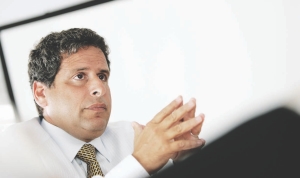Robert Amsterdam’s advice to Canadian businesses and government regarding Russia is simple: be firm.
During a recent speech to members of the Economic Club of Toronto the lawyer to one of Russia’s most famous convicts — former oil oligarch Mikhail Khodorkovsky — admonished Russia’s current administration for ignoring the rule of law and creating one of the most corrupt business environments on the planet.
Amsterdam’s observations are the product of years spent defending Khodorkovsky, the former CEO of Yukos, in a trial he says had nothing to do with the legality of his client’s actions and everything to do with Russian politics.
Before being charged with six crimes, including tax evasion, Khodorkovsky was openly supportive of President Vladimir Putin’s opposition. That led Amsterdam to label the proceedings a “show trial,” and, in an unusual move for a defence attorney, he conceded that his client would be found guilty before the trial even began.
Knowing a legal fight was futile, Amsterdam vowed to take his arguments into the political realm and since his client was found guilty in 2005, he has fashioned himself into a leading pundit against not only the ailments of the Russian state, but also foreign complicity in the form of foreign direct investment.
“When our corporate leaders give up the idea that transparency is necessary, and believe that they can jump in bed with the oligarch of choice because he happens to be near Mr. Putin, shame on them — and shame on those who continue to invest in corporations that defy corporate governance and believe we are better off in the translucent opacity of authoritarian dictate than we are under the rule of law,” he said.
But despite such endemic corruption, Amsterdam doesn’t think the West should turn its collective back on Russia, as such an isolationist stance would only exacerbate difficulties there.
Supporting Russia’s application to the World Trade Organization (WTO) and getting it to sign on to more international agreements are more constructive steps, he said.
However, instead of vociferously encouraging such strictures of international law and trade, Amsterdam said the corporate world and Western governments are lacking conviction, preferring instead to pander to the ruling class with the hope of cutting a lucrative deal.
“When our leaders deny the rule of law and travel to Moscow and kiss the ring of Vladimir Putin, shame on them,” he said.
Such comments were tailored to fit former German Chancellor Gerhard Schrder, who recently became a part of the Kremlin clique in an effort to secure lucrative deals for German businesses, Amsterdam said.
In place of such a myopic approach to foreign relations, Amsterdam says the West should tap into the throngs of Russian citizens who believe in real democracy and would install a more transparent business environment if they could wrest power away from Putin and his powerful clique — commonly referred to as “the Corporation.”
As for the often heard, but seldom printed point-of-view that Russians have a natural antipathy towards democracy, Amsterdam labelled the notion a myth whose propagation results in a self-fulfilling prophecy.
And regarding Canada’s position toward the Great Bear of the East, Amsterdam favours a roll-up-the-sleeves and get-in-there approach.
“The scenario is not whether or not we should engage. . . We need to talk, need to engage all the time, that is the Canadian way,” he says. “It is the Canadian way that the rule of law is the grammar within which we all must work.”
Canada, he says, is in a unique position to help bring about change, as it embodies the aggressive corporate attitude of the West that Russians admire, while lacking the American manifest destiny ideology that so many Russians bristle at.
While labelling the government- controlled oil behemoth, Gazprom, the most corrupt company in the world, and warning Petro-Canada (PCA-T, PCZ-N) against doing business with it — as it is proposing — Amsterdam holds more hope for Canadian miners and mineral explorers.
In an interview, Amsterdam told The Northern Miner that the corruption of the oil and gas sector hasn’t spilled into the mining sector, especially where deposits fall into jurisdictions with strong mineral expertise and an appreciation for foreign investment.
He said he had high hopes for the role that Canadian junior mining companies can play in terms of bringing better business practices to the country.
Some Canadian-based miners and explorers with interests in Russia include: Barrick Gold (ABX-T, ABX-N), Centrasia Mining (CTM-V, CTMHF-O),High River Gold Mines (HRG-T, HRIVF-O), Kinross Gold (K-T, KGC-N), Lundin Mining (LUN-T, LMC-N), Oriel Resources (ORL-T, ORI-L), Vostok Minerals (VOS-V, VOSMF-O), and Zoloto Resources (ZR-V, ZRSCF-O).


Be the first to comment on "How to approach a bear: Amsterdam’s advice on Russia"